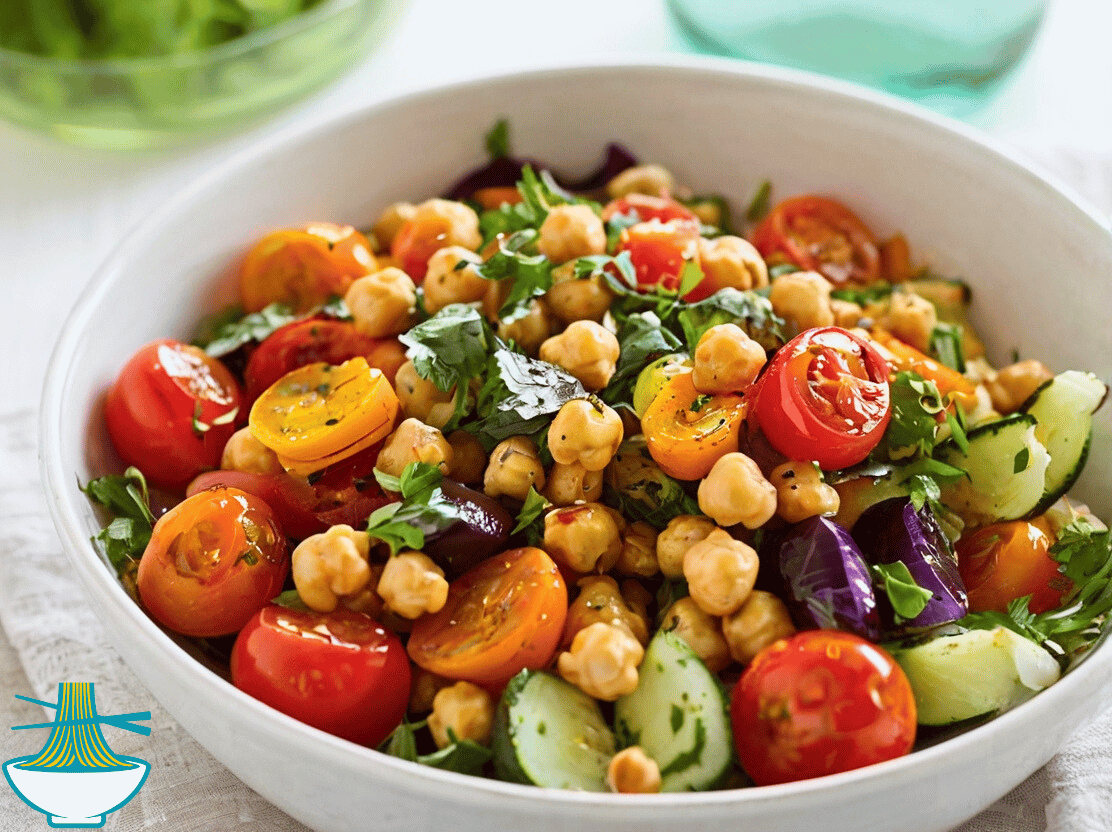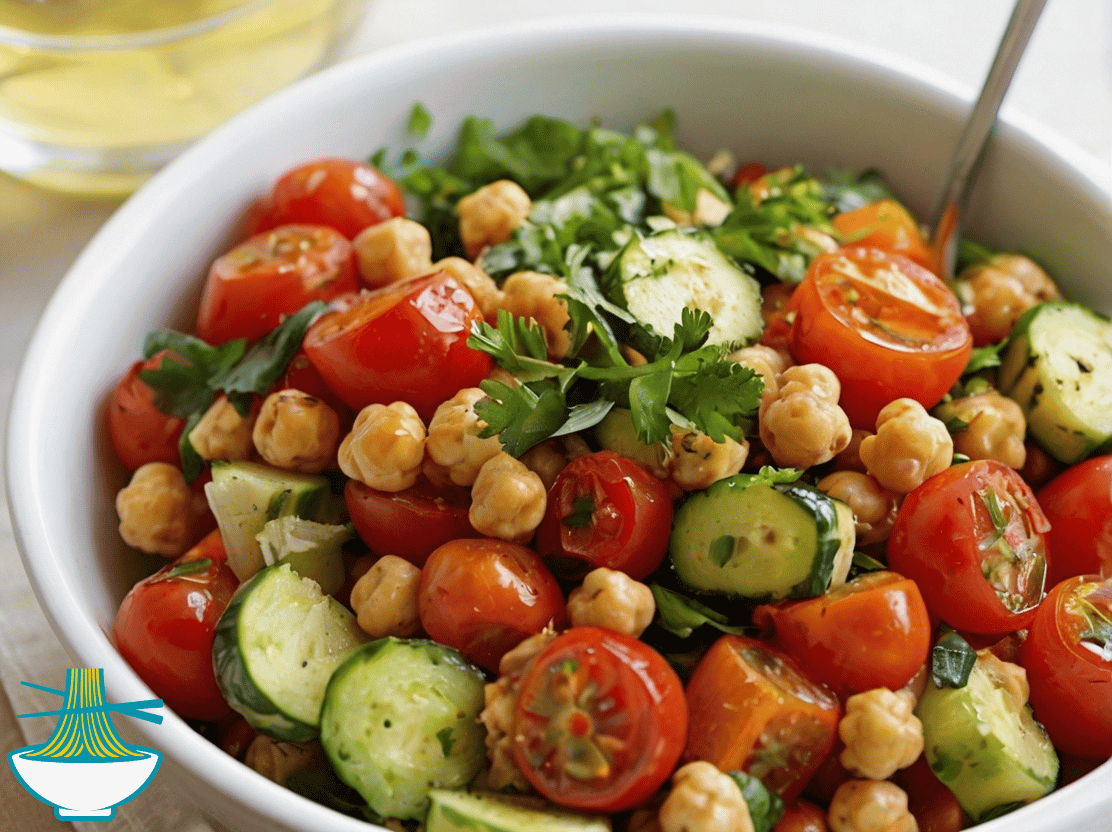This vibrant salad combines roasted vegetables, chickpeas, and mixed greens, drizzled with balsamic vinegar for a flavorful, nutritious meal. Packed with vitamins, minerals, and fiber, it's a perfect choice for those looking to eat healthily and lose weight.

Roasted vegetable and chickpea salad is a modern twist on traditional Mediterranean cuisine, which has long celebrated the health benefits of fresh produce, legumes, and olive oil. The combination of roasted vegetables and chickpeas has been enjoyed in various forms across cultures for centuries, reflecting a culinary heritage that values simplicity, flavor, and nutrition. This contemporary recipe aligns with the growing trend of incorporating plant-based foods into diets for improved health and weight management.
Ingredients:
- 1 can (15 oz) chickpeas, drained and rinsed
- 2 cups mixed vegetables (e.g., cherry tomatoes, zucchini, bell peppers), chopped
- 2 tablespoons olive oil
- 1 teaspoon dried thyme
- Salt and pepper to taste
- 4 cups mixed salad greens
- ¼ cup balsamic vinegar
Instructions:
1. Preheat oven to 400°F (200°C).
2. In a bowl, toss chickpeas and mixed vegetables with olive oil, thyme, salt, and pepper.
3. Spread the mixture on a baking sheet and roast for 20-25 minutes, stirring halfway through.
4. Divide salad greens among serving plates. Top with roasted vegetable and chickpea mixture.
5. Drizzle with balsamic vinegar before serving.

Nutrition Value:
1. Chickpeas (1 can - 15 oz):
- Calories: Approximately 350 kcal
- Carbohydrates: Around 60 grams
- Protein: About 19 grams
- Fat: Roughly 6 grams
- Sodium: Minimal, typically less than 10 mg
- Cholesterol: None
- Vitamins & Minerals: High in fiber, folate, iron, magnesium, and potassium.
- Nutritional Benefits: Chickpeas are rich in plant-based protein, fiber, and complex carbohydrates, which promote satiety and stabilize blood sugar levels. They also provide essential minerals and vitamins, supporting heart health and digestion.
2. Mixed Vegetables (2 cups - e.g., cherry tomatoes, zucchini, bell peppers):
- Calories: Approximately 50-100 kcal depending on the mix
- Carbohydrates: Varies, mainly from fiber and natural sugars
- Protein: Minimal, typically 1-3 grams
- Fat: Negligible
- Sodium: Low, unless seasoned heavily
- Cholesterol: None
- Vitamins & Minerals: Rich in vitamins A, C, and K, as well as antioxidants like lycopene and beta-carotene. Also a good source of potassium and fiber.
- Nutritional Benefits: Mixed vegetables provide a diverse array of vitamins, minerals, and antioxidants essential for overall health. They support immune function, promote healthy skin, and may reduce the risk of chronic diseases.
3. Olive Oil (2 tablespoons):
- Calories: Around 240 kcal
- Carbohydrates: None
- Protein: None
- Fat: Approximately 28 grams (mostly monounsaturated)
- Sodium: Minimal
- Cholesterol: None
- Vitamins & Minerals: Contains vitamin E and K, as well as antioxidants.
- Nutritional Benefits: Olive oil is a key component of the Mediterranean diet and is rich in heart-healthy monounsaturated fats. It also provides antioxidants and anti-inflammatory properties, promoting cardiovascular health and reducing inflammation.
4. Dried Thyme (1 teaspoon):
- Calories: Negligible
- Carbohydrates: Negligible
- Protein: Negligible
- Fat: Negligible
- Sodium: Minimal
- Cholesterol: None
- Vitamins & Minerals: Contains small amounts of vitamins C and K, as well as iron and manganese.
- Nutritional Benefits: Thyme is a flavorful herb that adds aroma and taste to dishes without adding significant calories or sodium. It also provides small amounts of vitamins and minerals, contributing to overall nutrient intake.
5. Salt and Pepper (to taste):
- Calories: Negligible
- Carbohydrates: Negligible
- Protein: Negligible
- Fat: Negligible
- Sodium: Varies depending on usage
- Cholesterol: None
- Nutritional Benefits: While salt adds flavor, it should be used in moderation to avoid excessive sodium intake, which can contribute to high blood pressure and other health issues. Pepper adds flavor without additional calories or sodium.
6. Mixed Salad Greens (4 cups):
- Calories: Approximately 20-40 kcal
- Carbohydrates: Varies, mainly from fiber
- Protein: 1-2 grams
- Fat: Negligible
- Sodium: Low, unless dressed heavily
- Cholesterol: None
- Vitamins & Minerals: Rich in vitamins A, C, and K, as well as folate and potassium.
- Nutritional Benefits: Salad greens are low in calories and rich in fiber, vitamins, and minerals. They contribute to hydration, digestion, and overall health, while adding freshness and texture to meals.
7. Balsamic Vinegar (¼ cup):
- Calories: Approximately 50 kcal
- Carbohydrates: Around 12 grams (mainly from sugars)
- Protein: Negligible
- Fat: Negligible
- Sodium: Minimal
- Cholesterol: None
- Vitamins & Minerals: Contains small amounts of potassium and calcium.
- Nutritional Benefits: Balsamic vinegar adds tanginess and depth of flavor to dishes without extra calories or fat. It also provides antioxidants and may offer some digestive benefits.
Summary of Nutritional Benefits:
This recipe provides a balanced array of nutrients essential for overall health and well-being. It's rich in plant-based protein, fiber, vitamins, and minerals while being low in unhealthy fats and cholesterol. The combination of chickpeas, vegetables, olive oil, and greens offers a satisfying and nutritious meal option suitable for those seeking to maintain a healthy weight and lifestyle.



Comments